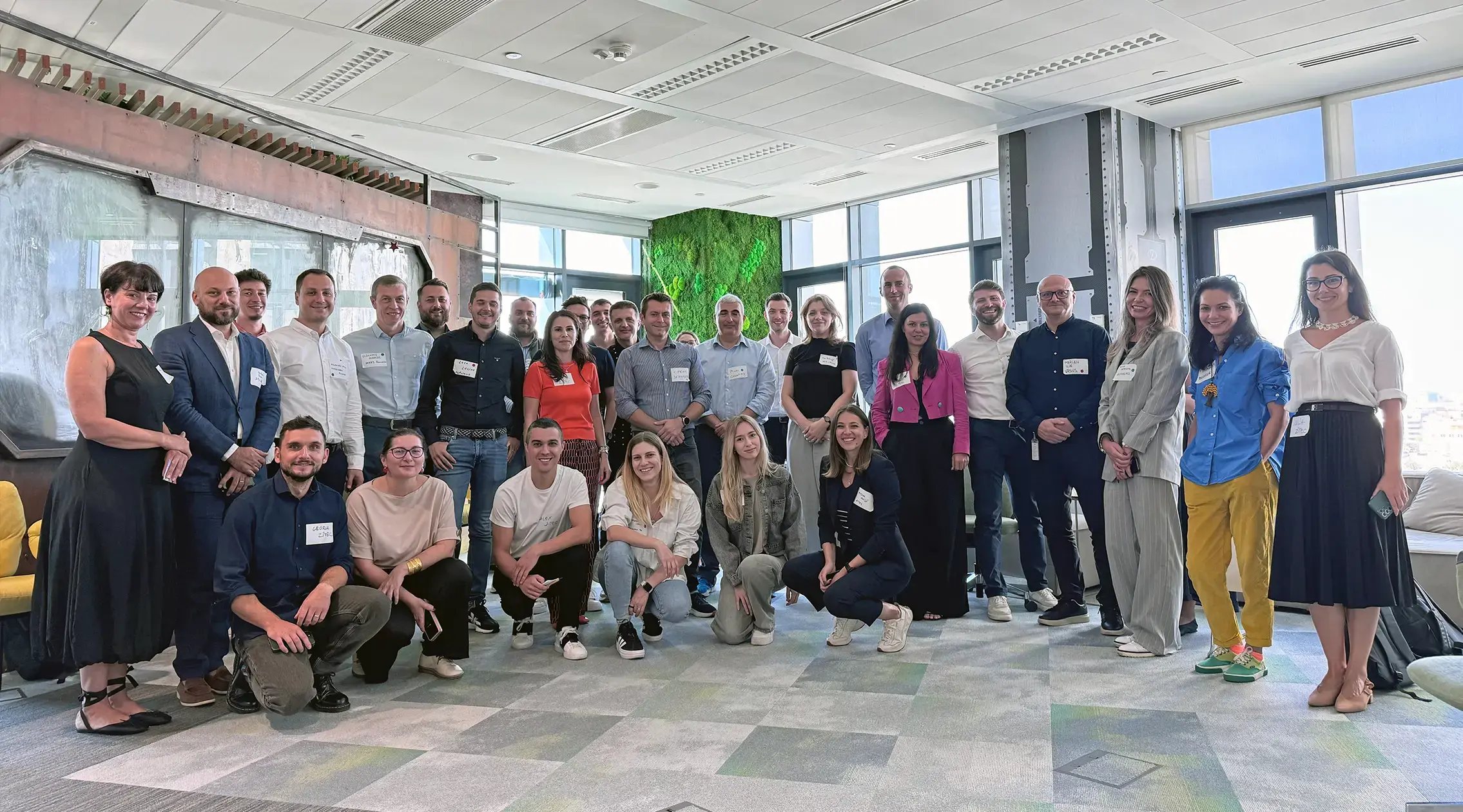It’s been a year of rapid change and significant challenges. Yet, we’ve remained dedicated to helping retailers navigate the industry's future with the insights and strategies needed to stay ahead.
Looking ahead, the road appears equally challenging, with consumer spending expected to decline and the market contracting. But while purchasing behavior may become more cautious, consumer expectations are climbing higher. They still demand faster, better, and more personalized experiences.
What's Next for European Retailers?
In this environment, the key question for retailers is: How can they rise to the challenge and ensure their brands remain competitive, both in retaining existing customers and attracting new ones? This question has never been more urgent.
To thrive in this evolving landscape, we must continuously innovate, adapt, and put customer needs at the center of everything we do. Consumers expect tailored experiences, convenience, and flexibility like never before.
Alex Dobre
Retail & Distribution Director, Zitec
Building on the success of our earlier roundtable about AI in retail organized together with Google, we hosted a second exclusive event to look at what strategies were successful particularly around customer loyalty and creating seamless, cross-channel experiences.
We brought together top minds from Agrii Romania, Decathlon, SAMEDAY, and NETOPIA Payments to share their insights on shaping the future of retail, blending digital payments, last-mile delivery, and exceptional customer experiences.
These discussions explored transformative approaches, from leveraging MVPs (Minimum Viable Products) for digital breakthroughs to cultivating long-term customer loyalty.
In this article, we’ll highlight the key insights and best practices shared during the event, offering actionable takeaways for businesses eager to succeed in today’s and tomorrow’s market. As consumer expectations soar and competition intensifies, brands are under increasing pressure to innovate.
Let’s then take some inspiration from these four companies, rewriting the rules of success by streamlining operations, personalizing experiences, and embracing cutting-edge technology
The power of MVPs: Agrii's digital revolution
In retail, digital innovation can quickly become overwhelming, with changing market demands and complex dependencies leading to delays and missed deadlines.
Many retail transformation projects face challenges with budgets and timelines, yet a more effective approach is to start small and agile with an MVP. By focusing on a functional core version of a solution, retailers can
- Achieve meaningful results quickly
- Gather customer feedback
- Adjust as needed
All while controlling costs and reducing risks, driving continuous innovation in line with evolving consumer needs.
At Zitec, we say to our clients: Based on our experience it will hurt you if you start with a long, complex engagement that risks run-away spends or huge upfront fixed costs. Instead, consider starting with a confined yet impactful business application, such as an MVP. This approach allows for tangible results within months rather than years.
Lucian Daia
CTO, Zitec
To showcase a success story of this approach to innovation, our first panel brought together two experts from Agrii Romania, one of the most important players on the agribusiness market, who talked about how they’re mixing digital innovation with expert consulting to drive real, meaningful change in their field.
One of Agrii's most significant moves has been its shift toward digitalization and central to their success was indeed the MVP strategy. In the agri-retail sub-sector, where tech adoption can be slow, Agrii's focus went beyond digital sales to building a service ecosystem that tackles real challenges faced by their customers.
By testing and refining their platform to meet the needs of their users, Agrii ensured technology provided genuine value, reducing friction and enabling their sales agents to prioritize high-value consultations.
|
The company is no longer just a distributor, but has become a trusted advisor by combining technology with hands-on consultancy. Their groundbreaking B2B platform, initially launched as an MVP and developed in partnership with Zitec, is a prime example of this transformation. The platform integrates real-time order placement, financial dashboards and 24/7 access to customer data, marking a major shift from traditional methods to a more streamlined, data-driven approach. Additionally, the shift to the platform was accompanied by extensive training, and support for users to facilitate clarity and a smooth adoption. The result? Agrii is now able to automate routine tasks, empowering their own teams to provide more personalized, expert advice to their clients. This blend of technology and consultancy has set Agrii apart from competitors, establishing them as a transformative force in agribusiness. |
Key insights from Agrii’s MVP strategy:
- Embrace iterative innovation. Focus on the value your business offers. You can enhance it through digital solutions, beginning with a minimal viable product (MVP).
- Test and refine. An MVP lets you gauge user reactions and refine your product based on feedback, without risking a large investment in a solution that might be a flop.
- Empower with technology. The MVP launch strategy should mirror a new product introduction: start with early adopters who love trying new things, then gradually bring in the more hesitant crowd.
Seamless customer journeys: the Decathlon, NETOPIA Payments, and Sameday approach
In retail, time is one of the most valuable assets. Customers demand quick, simple, and efficient experiences. This is why creating frictionless interactions is essential, with personalization being a key strategy to achieve it and reduce unnecessary steps.
For example, by focusing on personalization, Decathlon leads the way in this area. By gathering and leveraging customer data, Decathlon tailors online shopping experiences to individual preferences, ensuring that, for example, soccer players aren’t suggested fishing gear.
Flexibility is another crucial element in creating a seamless customer journey. By offering flexible last-mile options such as home delivery, in-store pickup, secure locker collection, or flexible return policies, businesses can empower consumers to choose the most convenient option that fits their needs.
|
A great example of how this versatility enhances the customer experience comes from SAMEDAY. Over the past year and a half, their market studies have shown that flexibility, predictability, and control over the delivery process have become more important to customers than simply fast delivery. More so, SAMEDAY’s commitment to flexibility is also illustrated through its collaboration with Zitec and the development of a mobile app that allows customers to track deliveries in real time, reroute packages, and adjust storage options. They also introduced a feedback loop that lets customers rate couriers and suggest improvements |
NETOPIA Payments sees simplicity and predictability as essential for the long-term success of online commerce. Faster, frictionless payments enhance the customer experience, while mobile-integrated options like Apple Pay and Google Pay streamline checkout by auto-filling delivery details.
Smart payment solutions like WalletPay empower online stores with real-time transaction tracking and optimized management, driving efficiency and growth.
Key insights from what works for Decathlon, NETOPIA Payments and SAMEDAY:
- Personalization drives engagement. Tailoring experiences to individual preferences enhances relevance, making shopping more efficient and satisfying for customers.
- Flexibility in delivery is crucial. Customers value control over their delivery options, real-time tracking, flexibility, and predictability are more important than just speed.
- Simplicity builds loyalty. Streamlining the purchasing process, such as simplifying payment methods and reducing steps, saves time and encourages repeat business.
3. Loyalty reimagined: keeping customers engaged
As customer expectations continue to evolve, so must loyalty programs. Leading brands like Decathlon, SAMEDAY, and NETOPIA Payments are reshaping the way customer loyalty is built in today’s tech-driven world.
|
Take Decathlon, for example. They learned through early experiments that to truly engage customers, they need to listen to what people want. As one of their initiatives, they tried offering rewards for experiences like sporting events, but after a few months, they found this approach didn’t resonate as much as they had hoped. Simple discounts, it turns out, were far more appealing. Today, Decathlon continues to fine-tune their loyalty offerings to better match what their customers actually want and need. |
SAMEDAY’s loyalty strategy focuses on practical innovations. Just like Decathlon, SAMEDAY emphasizes the importance of gathering customer feedback and using it to drive continuous innovation.
As they shared during discussions, customer loyalty is driven by a deep understanding of client needs. Features like parcel extensions at easybox, package redirection, delivery to a neighbour, and easybox returns reflect these insights. The priority of these features is based on what customers have identified as most important.
The result? A natural sense of loyalty formed, as customers developed a deeper connection with the brand. For example, when they are using the app time and time again, they may find themselves checking it more often, whether to redirect a parcel or extend a pick-up time, and it becomes second nature. This ongoing engagement fosters a different kind of relationship with the company, turning a one-time transaction into a continued interaction.
In the context of loyalty, BNPL solutions can also be crucial for high-value purchases, as they provide customers with greater flexibility. This can help attract and retain clients who might not have made a purchase otherwise, fostering long-term loyalty by making products more accessible.
Key insights from these retail brands:
- Adapt to customer needs. Loyalty programs must evolve based on customer feedback and preferences, ensuring offerings stay relevant and engaging.
- Innovate continuously. Successful brands use customer insights to drive innovation, creating features and services that address real customer pain points and enhance loyalty.
- Provide a seamless experience. Integrating loyalty rewards into everyday interactions, such as payments or app usage, helps create a smooth, repeatable experience that encourages ongoing customer engagement.
4. Engaging new generations to meet the demands of Gen Z and Alpha
To engage younger generations, retailers must meet their demand for instant, transparent, and convenient solutions. Gen Z and Gen Alpha expect seamless, engaging experiences, prompting businesses to optimize their digital flows. These generations value simplicity, so online processes like purchasing and product discovery must be streamlined with as few clicks as possible. Retailers should examine their workflows for friction points where users abandon the app due to complexity. Simplifying and automating these steps can have a big impact.
The benefit is that younger generations aren’t afraid to speak up, making it easier for businesses to identify issues, if they take the time to listen. Retailers looking to succeed in today’s competitive landscape must embrace Gen Z and Gen Alpha as their new primary customers, staying connected through constant feedback loops and using first-party data to personalize shopping experiences.
The key to engaging Gen Z and Alpha users:
- Offer seamless experiences. Gen Z and Gen Alpha want instant solutions, requiring brands to streamline their digital processes for ease and speed.
- Simplify processes. With short attention spans, younger users expect quick, simple interactions. Reducing complexity is key to preventing drop-offs.
- Act on feedback. Young consumers are vocal about their needs. Brands that listen and act on this feedback, like Decathlon and Sameday, create more intuitive, customer-focused experiences.
Looking ahead at the Retail Industry
The retail landscape will continue to evolve at a rapid pace, presenting both challenges and opportunities for brands. With consumer expectations higher than ever and purchasing behavior shifting, retailers must adapt quickly to stay competitive.
The key to success will lie in continuous innovation, understanding customer needs, and creating frictionless, personalized experiences.
Industry leaders like Decathlon, SAMEDAY, and Agrii Romania demonstrate that embracing digital transformation, using customer feedback, and prioritizing simplicity can drive significant improvements in customer loyalty and satisfaction.
Businesses can achieve this by leveraging MVP to quickly test, launch, and refine products, while ensuring a seamless cross-channel experience. Moreover, flexible solutions like BNPL are setting new standards for both customer expectations and what retailers must deliver.
Ultimately, the brands that will thrive are those that not only respond to change but anticipate it, using technology to enhance human connections and build lasting customer loyalty. As we look ahead, staying focused on innovation, personalization, and simplification will be the pillars that support continued growth and success in the face of an increasingly complex retail environment.






.webp)